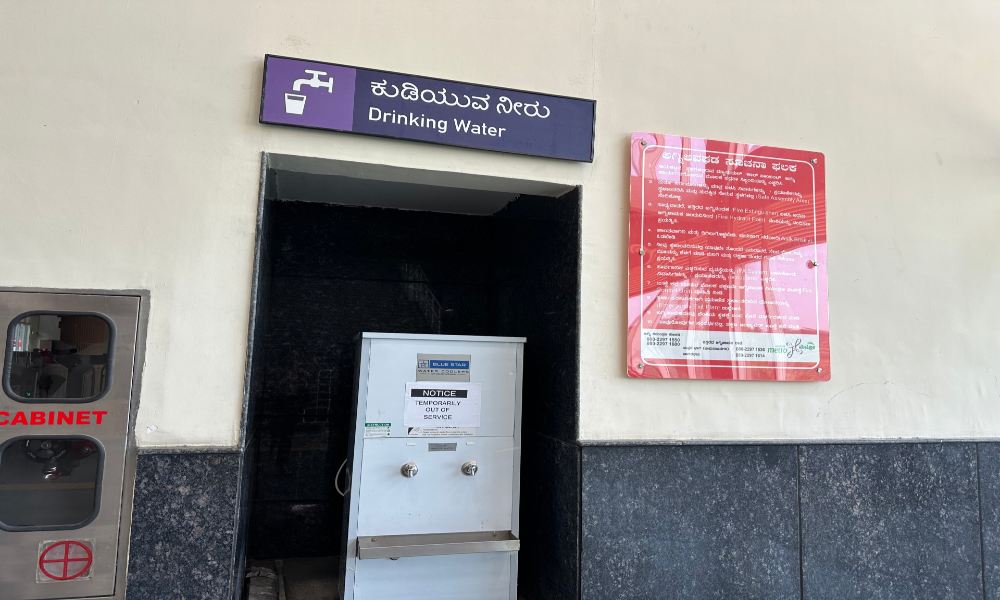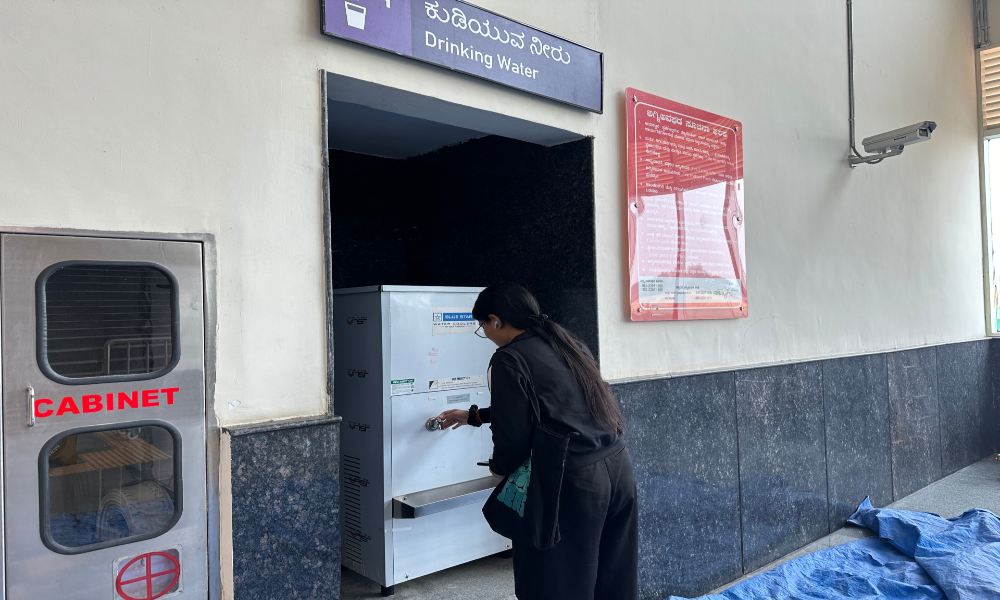Challaghatta metro station became operational on Oct. 9; the station still doesn’t have a drinking water facility for commuters and staff. The authorities promise to solve the problem at the soonest.
The much-awaited Challaghatta metro station of the Purple Line does not have drinking water facility for commuters and staff, annoying both equally.
Yashavanth Chavan, Chief Public Relations Officer (PRO) of Bengaluru Metro Rail Corporation Ltd (BMRCL), said that they installed the water dispensing machine since the opening of the metro station and first said that there was no such problem.
However, when Chavan found out that the water vending machine has been non-functional since the opening of the metro station, he said that it might have happened due to the negligence of metro inspectors.
Sunitha, security staff at Challaghatta metro station said that getting water is a big problem, as the water dispensing machine doesn’t work. She said that she has to carry a water bottle every day from home which is not sufficient.
Karthik, an employee at the TATA Consultancy Services (TCS) who regularly travels from Challghatta to Whitefield for work, said that at times he wants to have water in the evening while coming back from the office as his home is 30 minutes away from Challaghatta metro station. He said that it would be easier for him if the water facility became functional at the metro station.

Chavan said that he would direct the people concerned to solve this issue within one week as “commuters are the king of BMRCL.” He added that such problems are not acceptable. Many other metro stations such as Singayyanapalya and Kengeri Bus Terminal metro station also face irregular water supply in their dispensers.. They might have water in the morning, but by the evening, it usually runs out.
A worker at the Kengeri Bus Terminal metro station said that water comes irregularly from the dispenser, and at times there is no water at all. He added that the dispenser is fine; the problem sometimes is with the pipe connection.
Chavan said that water is stored at all metro stations in case of emergencies such as fire. The first priority is to keep enough water for emergency requirements. After this, the water is redirected to the drinking purposes post filtering. He said that irregularities in the water supply could be because of low water levels in storage tanks or due to pipe dysfunctionality.
Anirudh Gaurang, Senior Research Associate at the Indian Institute of Public Health, said, “Ensuring public drinking water systems are well-maintained and regularly cleaned is crucial to guaranteeing the safety and quality of the water. The importance of water accessibility in public places cannot be overstated. It is a fundamental human right and a critical aspect of public health, hygiene, and overall well-being.”
Commuters also complain about the non-availability of drinking water inside the metro station as seven stations on the Purple Line have water facilities outside the metro stations and their concourses.
These stations include Cubbon Park, Sir M. Visveswaraya Station Central College, Krantivira Sangolli Rayanna Railway Station, Nadaprabhu Kempegowda Station Majestic, Dr. B.R. Ambedkar Station Vidhana Soudha, and Mahatma Gandhi Road.
Somnath, a commuter between Attiguppe and Halasuru, said that each time he has to drink water, he has to exit the Vidhana Soudha station as there is no way to get water inside the station. It is very time-consuming and costly, he added.
Anirudh said, “Access to clean and safe drinking water is a necessity for people in any society.” It is the responsibility of the government to provide drinking water facility at places like transportation hubs, and public institutions. There should be access to safe and potable water, encouraging people to stay hydrated and reduce the use of single-use plastic bottles, he added.




